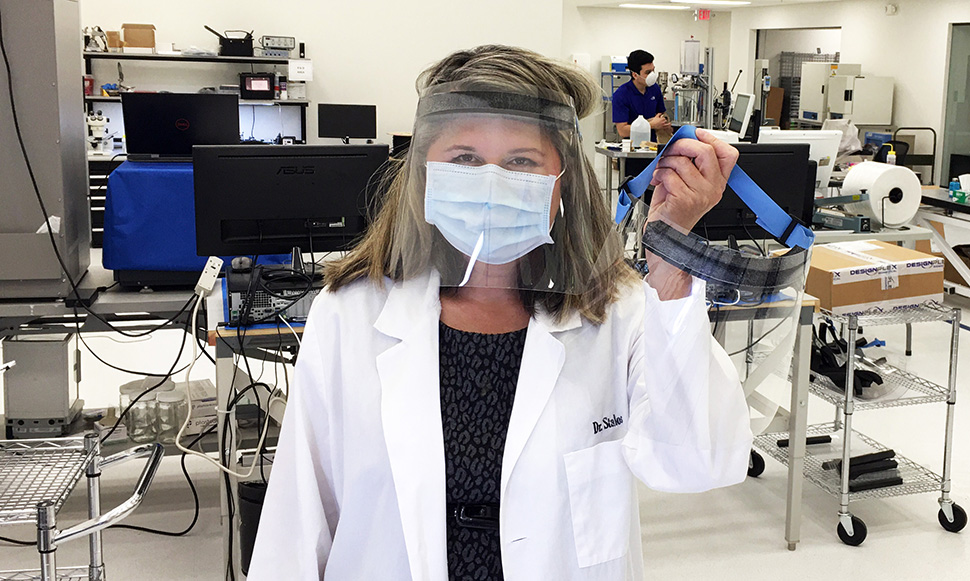Dr. Steffini Stalos is no stranger to adversity.
A local physician entrepreneur for the last decade, Stalos has vast experience helping laboratories at the nonprofit, for-profit, and government level. She’s been through everything from startup to shutdown, focusing on assisting each lab with overcoming challenges.
When the COVID-19 pandemic came along, Stalos had a new thought: “What if the unavailability of personal protective equipment thwarted coronavirus testing efforts, since laboratory personnel also use PPE?”
“We all now know personal protective equipment is a very highly sought after item,” she told Dallas Innovates. “Due to the lack of its availability, other solutions have to be found to try to deal with that.”
As a board-certified physician pathologist who consults medical laboratories, Stalos noticed her industry began to see supply chain gaps. She anticipated PPE’s global unavailability would translate locally, considering top-speed N95 mask production could only meet 3 percent of global demand.
“I have a laboratory consultancy business. And, as you might imagine during coronavirus, there was a lag time in getting coronavirus tests to the market,” she says. “I saw all the supply chain issues come to light—the RNA extraction kits were not right, the lack of nasal pharyngeal swabs, having to remake the viral transport media—so I thought ahead.”
Stalos knew lab personnel had to be able to take the necessary precautions to test specimen. So she set out to build a solution to the problem—find an indirect way help that specific part of the supply chain issue.
Introducing Core Medical Industries LLC, a new Dallas-based manufacturing company that Stalos launched to create jobs and bring medical devices to market. Named after the coronavirus, Core Medical will make solutions to fight current and future pandemics.
“I worry not only about this pandemic, but the more lethal organisms that lurk in the future,” she says. “We need to prepare for our future to minimize health and economic impact.”
Core Medical follows a “Made in America” mindset: It uses a U.S. supply chain, and products will go to Texans first. PPE will be available to senior living facilities, urgent care centers, acute care centers, pain and rehabilitation centers, primary care clinics, endoscopy centers, first responders, ambulatory surgery clinics, and clinical laboratories in the state.
The rest will be on reserve for other states and the federal government, according to Stalos.
“Until this pandemic, I hadn’t appreciated the relationship between supply chain infrastructure and the medical laboratory,” she says. “Medical testing has a unique role in healthcare and occupies a branch of medicine known as laboratory medicine. Test results are important because 60-70 percent of medical management decisions are determined by them. Supply chain interruptions now add an extra layer of complexity to labs.”
Stalos recognizes that Core Medical is a new player in a space occupied by industry giants. She also recognizes the numerous companies across the state—and beyond—that have stepped up to begin PPE production.
“Right now, there’s such a huge gap between supply and demand that I think there’s a lot of room for new players. The way in which Core Medical is different is that we’re bringing a medical device to market. So it’s not a homemade, and we have to prove that it can filter at a certain level, unlike with cloth masks,” she says. “This would be a medical device that will have supportive data that shows it can filter out a certain amount of particles for an N95.”
To be an N95 mask, Stalos says you have to prove that 95 percent of varying sizes of particulate are filtered out. And, that the wearer can breathe properly. Though the N95 is Core Medical’s current bread and butter that she plans to enter the market with, she’s also looking ahead.
“Only a small fraction of people are trying to go into a more long-term solution. Short term solutions are great, homemade solutions are great,” she says. “But I’m seeking more long-term and sustainable with higher filtration and antimicrobial antiviral masks because we’re dealing with a virus that, if we had enough PPE, we could handle.”
Stalos has also already gained the support of fellow Texans, and has a place of performance in Fort Worth and anticipated pre-production orders. This summer, a grand opening will be announced to offer a virtual tour of the facility to the public.
“I’m by no means an engineer, so there’s a lot of a learning curve to Core Medical Industries that I’m having to solve behind the scenes in order to bring to fruition PPE-generated in a Fort Worth location,” she says.
And, a pilot Southwest Consortium is underway with collaborators like DesignPlex Biomedical, TMAC, and TECH Fort Worth. She coined the phrase manufacturing response network as a nod to the already in place laboratory response network.
“I’m trying to create a novel system that can scale up to multiply effect, and then scale back when not needed,” she says. “I’m creating a kind of sustainability for the system, which I’m calling a manufacturing response network.”
Stalos has also applied to grants to sustain her efforts.
“Something that is novel is not so much the product per se, but the manufacturing system that we have in place,” she says. “The innovation is to try to create connections between already existing companies so that we can leverage each other’s strengths to upscale the capacity to make masks rather than wait for a brand new brick and mortar.”
![]()
Get on the list.
Dallas Innovates, every day.
Sign up to keep your eye on what’s new and next in Dallas-Fort Worth, every day.


































































